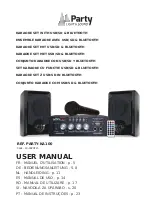
Safety instructions
For your safety
10
Item No.: 099-005073-EWM01
Workpiece, flying sparks and droplets are hot!
• Keep children and animals well away from the working area. Their behaviour is unpredictable.
• Move containers with inflammable or explosive liquids away from the working area. There is a danger
of fire and explosion.
• Never heat explosive liquids, dusts or gases by welding or cutting. There is also a danger of
explosions when apparently harmless substances develop high pressures in enclosed containers by
heating.
Take care to avoid fire hazards
• Any kind of fire hazards must be avoided. Flames can form e.g. when sparks are flying, when parts
are glowing or hot slag is present.
• A constant check must be kept on whether fire hazards have arisen in the working area.
• Highly inflammable objects, such as matches and cigarette lighters for example, must not be carried in
trouser pockets.
• You must ensure that fire extinguishing equipment - appropriate for the welding process - is available
close to the welding work area and that this equipment can be accessed easily.
• Containers in which fuels or lubricants have been present must be thoroughly cleaned before welding
begins. It is not sufficient simply for the receptacle to be empty.
• After a workpiece has been welded, it must only be touched or brought into contact with inflammable
material when it has cooled down sufficiently.
• Loose welding connections can completely destroy protective conductor systems of interior
installations and cause fires. Before beginning welding work, ensure that the earth tongs are properly
fixed to the workpiece or welding bench and that there is a direct electrical connection from the
workpiece to the power source.
Noise exceeding 70 dBA can cause permanent hearing damage!
• Wear suitable earmuffs or plugs.
• Ensure that other people who spend time in the working area are not inconvenienced by the noise.
Interference by electrical and electromagnetic fields is possible e.g. from the welding machine or
from the high-voltage pulses of the ignition unit.
• As laid down in Electromagnetic Compatibility Standard EN 50199, the machines are intended for use
in industrial areas; if they are operated in residential environments, for example, problems may occur
in ensuring electromagnetic compatibility.
• The functioning of heart pacemakers can be adversely affected when you are standing near the
welding machine.
• It is possible that electronic equipment (e.g. EDP, CNC equipment) in the vicinity of the welding site
could malfunction.
• Other mains supply leads, control leads, signal and telecommunications leads above, under and near
the welding device may be subject to interference.
Electromagnetic interference must be reduced to a level that no longer constitutes interference.
Possible reduction measures:
• Welding machines must be serviced regularly. (see Chap. Maintenance and care)
• Welding leads should be as short as possible and run closely together on or near to the ground.
• Selective shielding of other leads and equipment in the environment can reduce radiation.
Repair and modifications may only carried out by authorised, trained, specialist staff.
The warranty becomes null and void in the event of unauthorised interference.











































